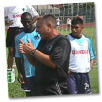More on Self Esteem
Last week during our panel discussion on Human Performance at
Psychologist Roy Baumeister was commissioned to survey the literature on self-esteem by the American Psychological Society. His work was published in the Winter 2006 issue of the Stanford Innovation Review http://www.ssireview.com/ “These studies show not only that self-esteem fails to accomplish what we had hoped, but also that it can backfire and contribute to some of the very problems it was thought to thwart.” Among his findings: Self-esteem does not make people popular or altruistic; does not keep children from indulging in sex, drugs, and alcohol; and is a result, not a cause, of good schoolwork.
Enhancing self-esteem is therefore a waste of time in the pursuit of health and well-being, Baumeister writes.
Instead, he suggests the most promising human strength is self-control. “Although the research on self-control is newer, the evidence already looks much better than the case for self-esteem ... [and] interventions that boost self-control have shown remarkable and sweeping benefits.”
We all need to think about this. As coaches and teachers it is our responsibility to correct deficiencies and set a high level of expectation. I firmly believe that your level of expectation determines your level of achievement. Let’s raise the bar! We must challenge our young people, for that matter we must challenge ourselves. I am reminded of a story from my good friend Dr. Joe Vigil, who coaches Dena Drossen ( Deena just won the London Marathon Sunday in American record time) She had just won her first National championships in Cross Country. After the race she came over to Joe and expected to be congratulated. Instead he challenged her. He said that when she won an Olympic medal he would congratulate her. Harsh,maybe? But Joe was doing his job he saw the potential that she possessed and was determined to help he achieve that potential. Eight years later in


1 Comments:
Bravo!
As a private school teacher and coach, I am constantly disappointed by parents' inability to think about what kind of adults these overindulged children will grow up to be. It is short sighted and irresponsibile to try to keep children happy all the time. Another great voice of reason on this subject is Dr. Mel Levine, who recently published, "Ready, Set, Here Life Comes," which discusses the consequences of raising children who are unable to be self-reliant and productive members of our society.
If sports are truly a metaphor for life, we need to be valuing and honoring true athletes-- and these aren't always the individuals with the greatest talent. They are the ones who work hard every day to make the most out of what they have and elevate everyone else around them to a higher level. I am just not sure we have any professional role models any more for kids to look up to. It is easier to reach for a bottle than workout, blame your teammates and coaches than take responsibility for your own poor performance, run to another team than takes responsibility for your selfish actions.
Post a Comment
<< Home